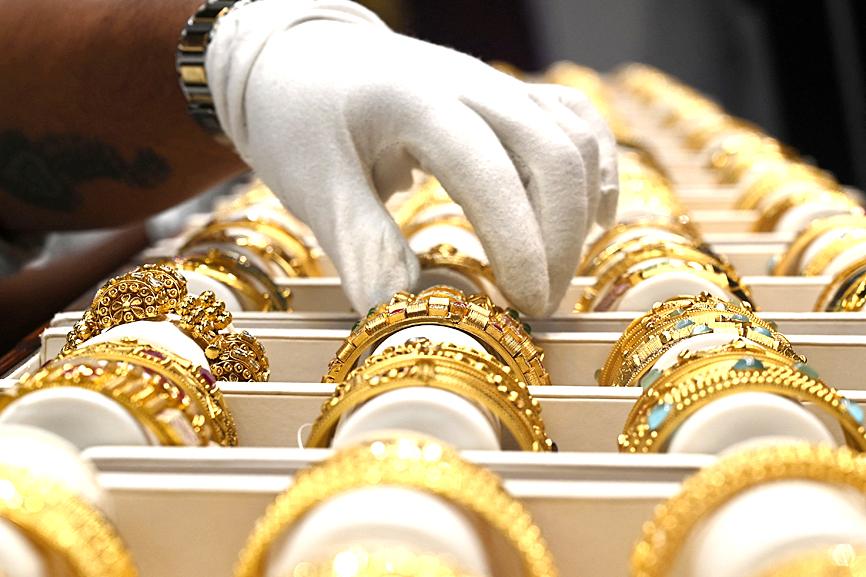Gold prices slid to the lowest in nearly two weeks as US bond yields surged, curbing the appeal of the non-interest bearing metal.
The global bond rout continued, with US 10-year Treasury yields jumping amid a debate on whether inflation is peaking. That helped inflation-adjusted rates turn positive for the first time in two years this week, a sign investors believe the US Federal Reserve could raise interest rates to cool inflation without severely hurting the economy.
Positive real rates reduce bullion’s appeal since it generates no interest.

Photo: AFP
“Yields are creeping higher again amid a raft of hawkish commentary from a variety of central banks that appears to be paving the way for increasingly aggressive action in the month ahead,” Oanda Corp senior market analyst Craig Erlam said. “This appears to be weighing on gold.”
Still, the precious metal is being supported by haven demand amid Russia’s war in Ukraine and rising inflation.
A Fed anecdotal survey showed that inflationary pressures have remained strong, clouding the outlook for future growth.
Gold prices are proving resilient — gaining more than 6 percent this year — as political and economic risks push investors toward the haven asset.
That is supporting purchases through gold-backed exchange-traded funds, which have seen holdings rise since last year, initial data compiled by Bloomberg showed.
Gold for June delivery fell US$13.90 to US$1,934.30 an ounce, declining 2.06 percent weekly.
Other commodities:
‧Silver for May delivery fell US$0.36 to US$24.46 an ounce, losing 4.82 percent on the week.
‧May copper fell US$0.12 to US$4.58 a pound, down 2.97 from a week earlier.

MULTIFACETED: A task force has analyzed possible scenarios and created responses to assist domestic industries in dealing with US tariffs, the economics minister said The Executive Yuan is tomorrow to announce countermeasures to US President Donald Trump’s planned reciprocal tariffs, although the details of the plan would not be made public until Monday next week, Minister of Economic Affairs J.W. Kuo (郭智輝) said yesterday. The Cabinet established an economic and trade task force in November last year to deal with US trade and tariff related issues, Kuo told reporters outside the legislature in Taipei. The task force has been analyzing and evaluating all kinds of scenarios to identify suitable responses and determine how best to assist domestic industries in managing the effects of Trump’s tariffs, he

TIGHT-LIPPED: UMC said it had no merger plans at the moment, after Nikkei Asia reported that the firm and GlobalFoundries were considering restarting merger talks United Microelectronics Corp (UMC, 聯電), the world’s No. 4 contract chipmaker, yesterday launched a new US$5 billion 12-inch chip factory in Singapore as part of its latest effort to diversify its manufacturing footprint amid growing geopolitical risks. The new factory, adjacent to UMC’s existing Singapore fab in the Pasir Res Wafer Fab Park, is scheduled to enter volume production next year, utilizing mature 22-nanometer and 28-nanometer process technologies, UMC said in a statement. The company plans to invest US$5 billion during the first phase of the new fab, which would have an installed capacity of 30,000 12-inch wafers per month, it said. The

Taiwan’s official purchasing managers’ index (PMI) last month rose 0.2 percentage points to 54.2, in a second consecutive month of expansion, thanks to front-loading demand intended to avoid potential US tariff hikes, the Chung-Hua Institution for Economic Research (CIER, 中華經濟研究院) said yesterday. While short-term demand appeared robust, uncertainties rose due to US President Donald Trump’s unpredictable trade policy, CIER president Lien Hsien-ming (連賢明) told a news conference in Taipei. Taiwan’s economy this year would be characterized by high-level fluctuations and the volatility would be wilder than most expect, Lien said Demand for electronics, particularly semiconductors, continues to benefit from US technology giants’ effort

‘SWASTICAR’: Tesla CEO Elon Musk’s close association with Donald Trump has prompted opponents to brand him a ‘Nazi’ and resulted in a dramatic drop in sales Demonstrators descended on Tesla Inc dealerships across the US, and in Europe and Canada on Saturday to protest company chief Elon Musk, who has amassed extraordinary power as a top adviser to US President Donald Trump. Waving signs with messages such as “Musk is stealing our money” and “Reclaim our country,” the protests largely took place peacefully following fiery episodes of vandalism on Tesla vehicles, dealerships and other facilities in recent weeks that US officials have denounced as terrorism. Hundreds rallied on Saturday outside the Tesla dealership in Manhattan. Some blasted Musk, the world’s richest man, while others demanded the shuttering of his